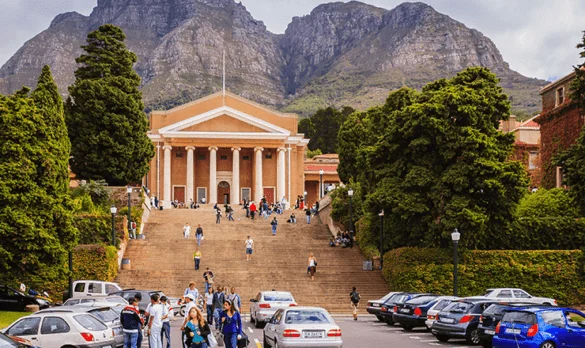Did you know? China is the “largest trading partner, foreign job creator, and source of foreign direct investment” in Africa. China routinely bankrolls mega construction projects, such as the new headquarters of the African Union and rail system in Addis Ababa, hydro power plants and oil refineries in Angola and Nigeria, or Zimbabwe’s international airport and new parliament building. It has also established its first foreign military base in Djibouti, and has become a major supplier of arms in sub-Saharan Africa.
Critics, though, view China’s economic influence as a new form of colonialism that, just like the old system, is premised on the exchange of African raw materials for Chinese goods, while simultaneously shoring up autocratic rulers. In this view, Africa’s growing indebtedness to China will undermine the sovereignty of African countries and curtail their economic development. As Nigerian writer Chika Ezeanya-Esiobu put it, the effect of Africa’s reliance on external assistance “will be the continued political and economic manipulation and domination of the region by the West, and now China, and soon the rest of the non-African world.”
In some ways, India’s involvement in education in Africa follows a different approach and is based on a different legacy. The Indian government does not systematically promote Indian culture the way China does with its vast network of Confucius Institutes. Compared with China’s, India’s relationship with African nations also has a longstanding tradition that has been shaped by centuries of sea trading between India and Africa’s eastern seaboard. The presence of more than 2.2 million ethnic Indians in South Africa and East African countries like Kenya and Tanzania has also helped strengthen relations, as did the common use of English, a common outlook on decolonization, and political cooperation in the Non-Aligned Movement. India was a principal architect of the movement and one of its leading proponents under Jawaharlal Nehru, the country’s first Indian prime minister.
India’s current objectives in Africa are similar to China’s, however. The country has a keen and growing interest in Africa as a market for its products and a source of commodities for its fast-expanding economy. Beyond that, efforts to deepen ties with Africa are an attempt to balance China’s influence and shore up diplomatic support on the global stage for objectives like a permanent seat for India on the UN Security Council. Delhi views China’s rapid economic and political expansion, notably the Belt and Road Initiative, as a geopolitical challenge that it seeks to counter, Africa inclusive.
These objections to statues honoring a foreign iconic figure raise questions about how beneficial the influence of China and India actually is for African societies. Modern education in Africa has always been shaped by external forces, if not directly imposed by them. Even after decolonization, African youths continued to learn in systems that followed foreign Euro-American paradigms, a trend that Western-dominated globalization helped perpetuate. The languages of instruction in most African countries, for instance, remain mostly those of global commerce and former colonial powers (English and French), whereas African languages, of which there are more than 2,000, are generally considered an impediment to economic progress. Instead of developing their own learning models, African nations remain dependent on the outside world to provide better education to their youths. Will curricula developed in India or vocational training programs suited for the needs of Chinese companies make any difference?
Newly built classrooms and academic institutions are a tangible benefit on a continent where some 60 percent of young people between the ages of 15 and 17 are not participating in any form of education (in the sub-Saharan region), and Africa’s total youth population is expected to double to 830 million by 2050. The emergence of greater South-South cooperation in education is generally a positive trend, and some have argued that assistance provided by countries that have more direct experience with developmental challenges could be a blessing. In the end, having more donors means more options for African countries, and it’s encouraging that the assistance provided by China and India is now increasingly focused on education, rather than just transportation or telecommunications technology.
However, the question is whether this assistance can help African nations strengthen their own capacities to develop sustainable, self-reliant education systems. Using a well-known catchphrase, Xi Jinping stated in 2015 that “China supports the resolution of African issues by Africans in the African way.” Leaving aside the Confucius Institutes, China does not paternalistically impose its own education model on Africa. But Beijing’s utilitarian hands-off approach, void of Western-style political conditionality, is equally problematic. Many critics consider its policies “tantamount to an export subsidy to Chinese firms, with a side order of backhanders for local elites.” If African rulers use the “financing as a patch for poor governance and irresponsible fiscal policies, then China’s no-strings-attached approach to doing business could indeed be disastrous.”
Africa doesn’t need classrooms built in the home village of local leaders to curry political favors. The self-serving training of mid-level skilled workers for Indian agri-businesses or the operation of Chinese railroads may have positive spill-over effects for the local populace, but that is not enough to alleviate Africa’s enormous need for education. What the continent requires is assistance to build up more independent Afrocentric education systems, and excellent local universities that can produce their own, local human capital. But South-South cooperation in African education is still in its infancy and generally heading into a positive direction. Time will tell if the increased competition for influence and good will in Africa can make a crucial difference in easing the continent’s learning crisis.



